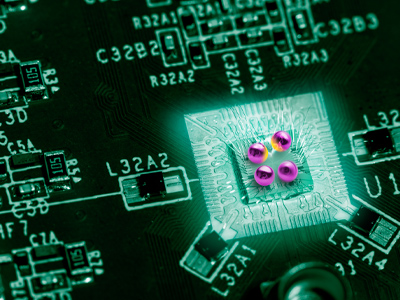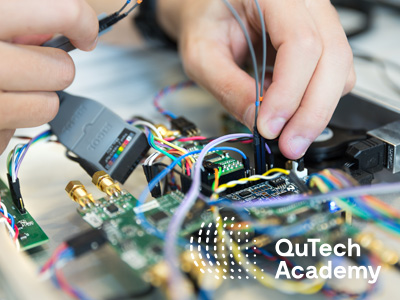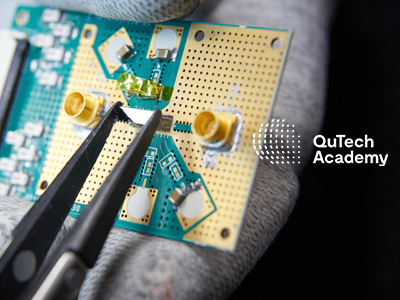Overview
Learn how to deploy artificial intelligence to control and calibrate semiconductor quantum computing chips.
Quantum computing is a fast-growing technology and semiconductor chips are one of the most promising platforms for quantum devices. The current bottleneck for scaling is the ability to control semiconductor computing chips quickly and efficiently.
This course, aimed at students with experience equivalent to a master’s degree in physics, computer science or electrical engineering introduces hands-on machine learning examples for the application of machine learning in the field of semiconductor quantum devices. Examples include coarse tuning into the correct quantum dot regime, specific charge state tuning, fine tuning and unsupervised quantum dot data analysis.
After the completion of the course students will be able to
- assess the suitability of machine learning for specific qubit tuning or control task and
- implement a machine learning prototype that is ready to be embedded into their experimental or theoretical quantum research and engineering workflow.
This course is authored by experts from the QuTech research center at Delft University of Technology. In the center, scientists and engineers work together to drive research and development in quantum technology. QuTech Academy's aim is to inspire, share and disseminate knowledge about the latest developments in quantum technology.
What You'll Learn
- To understand the utility of machine learning in tuning of semiconductor quantum devices
- To formulate various stages of tuning as a machine learning problem
- To develop and implement in Python a machine learning prototype for variety of semiconductor qubit tuning tasks
- To assess the suitability of machine learning in specific semiconductor quantum computing experimental workflows
Details
Course Syllabus
Week 0: Introduction to the course and self-study of the prerequisites
Week 1: Supervised learning for quantum dot configuration tuning
- Review of neural networks
- Formulate configuration tuning as a neural network learning task
- Applicability for quantum experiments
- Coding demonstration: supervised neural network configuration classification
Week 2: Charge tuning with neural networks
- Introduction to charge tuning
- Tuning to specific charge states as supervised neural network with feedback loop
- Experimental charge tuning
- Coding demonstration: charge state preparation using neural network with feedback loop
- Midterm exam (multiple choice)
Week 3: Unsupervised learning for analysis of quantum dot data
- Introduction to unsupervised learning
- Clustering methods for analysis of charge stability diagrams
- Outlook and applicability to experimental systems
- Coding demonstration: kernel-PCA clustering of charge stability data
Week 4: Fine-tuning with neural networks
- Introduction to fine-tuning
- Fine-tuning as a Hamiltonian learning problem
- Experimental fine-tuning
- Coding demonstration: Hamiltonian learning for qubit characterization
Week 5: Conclusion and Recap
- Overview of the techniques and applications
- Outlook for artificial intelligence as a tool for control and calibration of quantum devices
- Final exam - multiple choice and optional project (video brief) with a forum for questions
Qualifications
Chartered Engineering Competences
All our online courses and programs have been matched to the competences determined by KIVI’s Competence Structure, a common frame of reference for everyone, across all disciplines, levels and roles.
These competences apply to this course:
- A1: Extend your theoretical knowledge of new and advancing technologies.
- B1: Identify potential projects and opportunities.
Admission
This is a Massive Open Online Course (MOOC) that runs on edX.
Prerequisites:
Necessary prerequisites:
1. Programming in Python
2. Basic familiarity with quantum dots equivalent to the following videos:
- Quantum Computers: https://www.qutube.nl/courses-10/quantum-computer-12/quantum-computers
- How to build a qubit: https://www.qutube.nl/quantum-computer-12/how-to-build-a-qubit
- Spin qubits: https://www.qutube.nl/quantum-computer-12/spin-qubits-185
- Operations on spin qubits: https://www.qutube.nl/quantum-computer-12/operations-on-spin-qubits-176
- Electron spin qubits: https://www.qutube.nl/quantum-computer-12/electron-spin-qubits-332
- Capturing a single electron: https://www.qutube.nl/quantum-computer-12/capturing-a-single-electron-334
- Quantum dot qubits: https://www.qutube.nl/quantum-computer-12/quantum-dot-qubits-336
- Quantum control and readout: https://www.qutube.nl/quantum-computer-12/quantum-control-and-readout-338
Recommended prerequisites:
- Introductory knowledge of neural networks (we will provide reading material and review this concept at the beginning of the course, but some previous knowledge will better facilitate your learning). Recommended pre-read: https://cs231n.github.io (Module 1)
- Basic familiarity with PyTorch (we will take time to explain the code in detail, but looking at the PyTorch package before the course starts will be very helpful). Recommended pre-read: https://pytorch.org/tutorials/beginner/basics/intro.html


